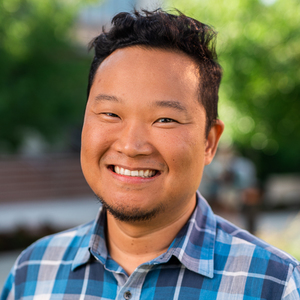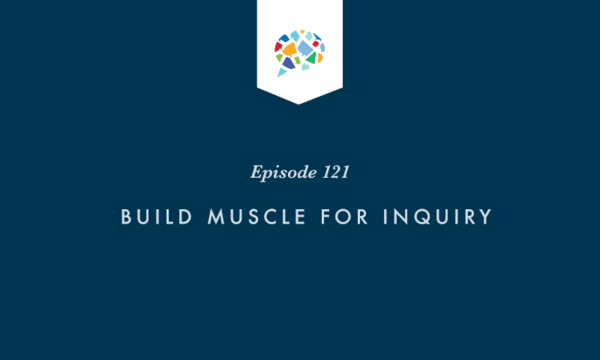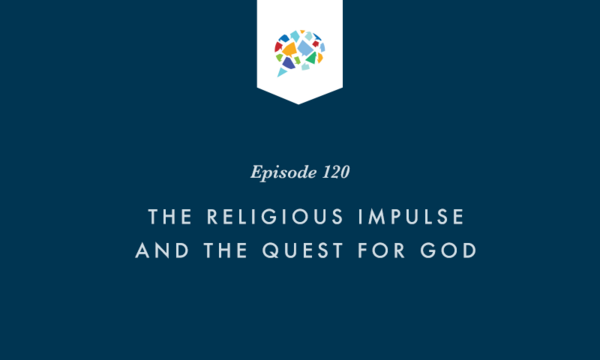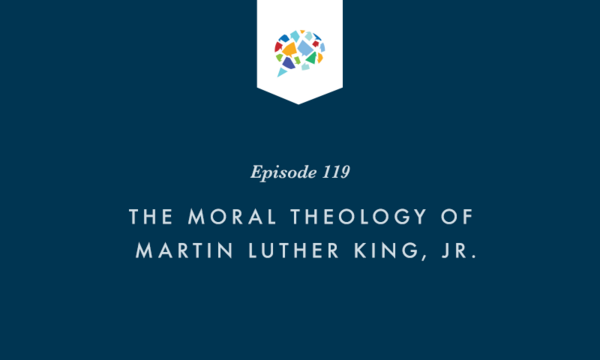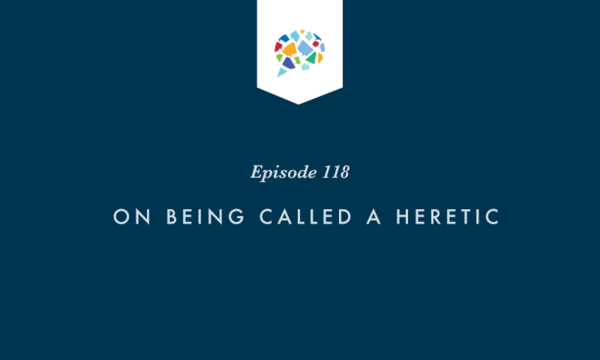
Chris McKinney, co-author of the book Neighborhoods Reimagined, is back on the podcast to speak with Tim and Mike on the surprising relevance of the beatitudes for being better neighbors. They also talk about a litmus test for gauging individualism, the challenges of “having time,” and Chris shares stories on the role of food in bringing people together, including a food event they creatively call “Bite of the World.”
Transcript
Tim Muehlhoff: Welcome to the Winsome Conviction podcast. My name is Tim Muehlhoff. I'm a Professor of Communications at Biola University, entering my 20th year at Biola University. I had hair when I started a long time ago. One of the great joys of being at Biola University is also being a part of something called the Winsome Conviction Project, where we seek to reintroduce compassion, civility, kindness, back into our disagreements with family members, fellow Christians, and also those outside the Christian community. We have two co-directors who join me, Dr. Rick Langer, and also Dr. Mike Ahn. Mike, welcome.
Mike Ahn: Well, thanks for having me again, and I'm so grateful to be one of the co-hosts here at the Winsome Conviction Project. I'm also in my day job the Dean of Spatial Development here at Biola University.
Tim Muehlhoff: Well, one of the key things we'd like to talk about here at the Winsome Conviction project is obviously the second great commandment. We need to be neighbors, we need to reach out to our neighbors, we need to love them as we would want to be loved. And then I think it's fascinating when Jesus says, "When you do the second great commandment, you've done the first," that loving God with all your heart, mind, and soul can be characterized by loving your neighbor. And to be honest, we need help. Most Americans would say we struggle with isolation. There's a male loneliness problem that has been well-documented by psychologists.
So how do you be a better neighbor? We had on the podcast already Chris McKinney with him and his wife Elizabeth, had written an amazing book called Neighborhoods Reimagined: How the Beatitudes Inspire Our Call to Be Good Neighbors. And we had them on, we had a fascinating talk about neighborhoods and then we just barely touched the Beatitudes and we thought, "My goodness, there's so much more to talk about. Let's have Chris back on and talk more about the Beatitudes." So Chris, welcome back to the Winsome Conviction podcast.
Chris McKinney: Thanks so much for having me back.
Tim Muehlhoff: Remind us just a little bit of what spurred you and your wife on at a crazy busy time of your life to go ahead and start to reach out to neighbors?
Chris McKinney: Yeah, it was really the desire for community. We realized that we needed a part of our community puzzle, if you will, needed to be people right around us, adults right around us. We got to know a few of our neighbors and one of them loved to fry things, so we did a fish fry and we like to say the rest is history. We did a couple other little events and we did a block party and I was shocked that neighbors actually showed up because we lived in a pretty typical neighborhood where people were isolated and independent and pulled into their garages and closed the door.
And so what we learned at that block party that people on the front presented this, "I'm fine, I'm good with my life. I'm okay, just leaving my next-door neighbor alone." But what we found was behind those front doors, there were people who were really excited about community and getting to know their neighbors and feeling a part of something bigger. And we've developed relationships, gotten to have spiritual conversations. It's truly been an enriching experience and just a joy to be a part of what God has done.
Tim Muehlhoff: If you are a fan of the Beatitudes, one of the things I love about this book is you then, as you seek to get to know your neighbors, you take the Beatitudes and you just lay them out. And we got a chance to cover the very first one last time you were with us on, blessed are the poor in spirit. But then to me, chapter two was just amazing when you talked about blessed are those who mourn for they will be comforted.
And let me just read one quick section, Chris, from your book, you and your wife Elizabeth write, "All around us, neighbors are suffering from alcoholism, self-doubt, chronic illness. The man across the street might be dealing with crippling anxiety, insomnia, lack of purpose. The mother a few doors up may be crying herself to sleep each night desperately worried about how to make ends meet. And the children who walk past every morning dreading the bully at school, do we wince? Do we cry out to God? Do we mourn? Does their pain impact us too?" So I love that part of your book, Chris, where you talk about the pain of our neighbors. Are we aware of it? Then how should we react to it?
Chris McKinney: Yeah, so for each Beatitude we had a counter Beatitude or a cultural Beatitude, maybe an invitation from the world. If Jesus invites us to mourn and to be comforted, the world would say blessed are those who numb out for they will be comfortable. And I think that's the big temptation is that when we see grief or pain or think about our neighbors struggling, it's very to tempting to want to numb out, to distract, to check our phones, to come straight home and head inside. But that's not the way of Jesus. We see Jesus mourned, he wept, he is described as a man of sorrows, and he invites us into that. And I think if we are not mourning or thinking about even if we don't know our neighbors, what could they possibly maybe be going through? Our hearts become really hardened. And so we really encourage people, one of the ways you can walk in this way of mourning is to lament, to bring a complaint.
So for example, if you go for a prayer walk in your neighborhood, you could say, "God, I am so upset that we are so isolated that I don't even know these neighbors. I don't know what's going on behind these doors." And then you can reflect in God's character, "I know that you love them and that you know want us to be connected." And then you just ask God, "Would you please connect us somehow? Give me the courage to plan a little fish fry or a barbecue so that I could get to know our neighbors." So mourning really is a place where your neighboring journey can start, you can start putting into action some of these steps.
Mike Ahn: Yeah, I think if I could reflect some of the sentiment of college students, and again, I don't know every college student, but again, just in general, man, I think they really relate to this grief statement, this paragraph that you wrote. They feel that anxiety, they walk in grief and they understand the neighbor who's struggling with different things because that's part of their reality too in a lot of ways.
One of the great things that I think you do in each chapter is that you create reflection questions. I'm curious, why did you do reflection questions and how much of knowing ourselves, knowing our story, knowing what we bring to the table, how much of that is so important in this journey of trying to reach out to our neighbors?
Chris McKinney: Yeah, so we also wanted this book to have the ability to be used in a communal way and in small groups. And so we wrote the discussion question so that we could process these things with others because the invitation into this Beatitude way of Jesus is not on our own. Yeah, there might be times when we're walking this way in our neighborhood, but this is an invitation for us to do this together. And so we want to encourage that discussion. And I think the Beatitudes, I mean it reads like a foreign language, it really does. It is so upside down. And so I don't think you can just kind of read about them or study them and not discuss them. If we're going to see this go from our heads to our hearts, I think that that process of discussion was really important to us and is important to us as we lead small groups and have been involved in ministry for 20 years now.
Tim Muehlhoff: One thing I love about the book is not just reflection questions, but you end each chapter with a prayer, a suggested prayer. Here's the one for a chapter you call Good Grief. The daily prayer reads, "Lord, help me to mourn the sad things around me, to know your comfort and to offer it to my neighbors too." I think that's just a beautiful prayer that kind of encapsulates the good grief part that can bring people together. You even say that pain is the unifying link that brings people together. Why add those prayers?
Chris McKinney: I think it's a way to begin interacting with this. I think if we're being asked to walk into our neighborhoods and be peacemakers for example, I mean, that's a tall task and that's daunting. But I think we can all pray, we can all go for a prayer walk and it's a way to engage with them. The one for poor in spirit, it's a little breath prayer, "Lord, help." So we encourage people if we're going to be poor in spirit, depending on God, as you walk over to the neighbor that you've lived next door to for maybe two or three years and you don't know their name, it's scary and embarrassing and you say, "Lord, help," as you walk over there, it's just an easy way to connect with that dependence and look to God for help.
Tim Muehlhoff: We were at a little league baseball game, which by the way is just pure sacrificial love because nothing happens during a little league baseball game. And in our neighborhood, there was a couple that, I mean, they just looked like a great couple, they'd been married forever and we just assumed things are going great. And I'll never forget sitting in the stands and having this gentleman, the game was being played on the field and this guy is coming scooting through the stands, stops right in front of me and Noreen and says, "Listen, I know you're a pastor," I'm not but he thought I was, he said, "My wife left me yesterday. We need your prayers." He said that in front of everybody.
And I of course said I would pray for him, but the response of the stands towards him was amazing, the amount of compassion with a couple that you thought had it all together, and you come to find out, which makes me think of the Harbor Negotiation Project, which is one of the top mediating group in the world, they say this, I've never forgotten this piece of advice, "People's lives are much, much harder than you think they are." And I think that fosters compassion. So I love that you say pain is the unifying link and to share your pain as you expect others to share theirs as well.
Chris McKinney: Yeah, I mean, I think we saw this during COVID. This was something we all went through together, and I don't know what it was like in other neighborhoods, but at first we thought, "Oh no," because our first book on neighboring came out right during COVID, Place for a Purpose, and we're like, "Oh man, what a terrible time to release a book on neighboring." But what we found was people were around, they were at home and we were all going through the same things. And so we found it proved to be a huge connection in our neighborhood. And so I think now that that's gone, I think it's good to remember that there are all sorts of things going on even behind the front doors of the neighbors that look like they have it all together. There is much pain because there's pain in our lives. And so that can give us compassion and it can move us to take a step towards them because we know they don't have it all together, even though that's what they're presenting.
Mike Ahn: Chris, I think, man, I really like the way that you've set up some of these Beatitudes and the cultural Beatitude of wanting to numb out versus just being a little bit more aware of our grief and aware of what we bring to the table. I'm just curious, how do you invite people into that process with you? Is there an example of what you've done? And I know the fish fry can let some relational things happen, but is there a way that you've said, "Hey, my door is open for you guys"? How do you try to engage your neighbors to say, "Hey, we want to be with you in all of these things"?
Chris McKinney: Yeah, so one of my favorite things that we ever did in the neighborhood, and we should do it again, was an international food festival. Sounds a lot fancier than what it was. But basically what Elizabeth and I were noticing throughout the years at these block parties especially is that there were more and more international families on the peripheral of the block party, and we just thought we lived in kind of white suburbia. But when we began to notice, we were like, "Man, there are people from all over." Some of them speak broken English, a lot of their names are hard to pronounce. And we began to mourn the isolation and the lack of connection that you could see physically at the block party. People weren't talking to them and they weren't talking to many others.
And so as we shared that with some of our neighbors who kind of help us and do some of these things, a couple of Indian descent said, "Hey, we want to help figure this out with you guys." And we're like, "Okay, we want you guys to lead something." And they said, "No way." And we said, "No, we'll help you, but we would love for you to take the lead on this." And as we thought about it, we were like, what if we did a little food gathering up at the common space area and we invite families from all different countries to bring a sample of their food, one of their favorite foods from their culture and a little display that they could set out. And we called it Buy to the World.
And we did it. And there was, I mean, probably eight or nine different countries represented, China, Israel, Brazil, Argentina, I mean Turkey, baklava, they showed up with baklava and then we invited the rest of the neighborhood, whoever wanted to come. And it was such a beautiful night. We got to know them, they got to know us. And from there, then we began to build other relationships, a lot of people of Indian descent, and it led to more conversations and connections. So I think that's a way that kind of collectively mourn something. And then kind of walked in the way of Jesus where Jesus says, "Blessed are those who hunger and thirst for righteousness, who want to put things right in their neighborhoods for they will be satisfied." And that's the feeling we felt after doing that event with our neighbors.
Tim Muehlhoff: Well, I'm so glad you brought up the Beatitude, "Blessed are those who hunger and thirst for righteousness," because it leads to, without a doubt, the worst chapter of the book. I do not understand why you had to include this chapter. It's called Not Just a Drive-Thru. And on page 82, it just ticks me off, Chris, you give a litmus test to see if we're falling prey to the counterfeit God of individualism and meanness. And here is your ultimately insensitive litmus test: "When you look at your calendar and to-do list, is there discretionary time available for unscheduled needs when you come home? Do you prefer to be autonomous and anonymous? How do you prioritize your freedom and needs, your family needs, your neighbor's needs? Do you see your neighbor's lives as integrally connected to yours?" Chris, Chris, I'm flunking every one of these and you're on our podcast.
So let me be really transparent, what if you just feel like I'm on the margins, "I don't have time, my job family needs, and now you're asking me to do a fish fry and think about the needs of other people? I honestly don't have the emotional reservoir or even I would argue the time, discretionary time." So what do you do with a person who might say, "Okay, I want to, but I'm done, I'm frazzled"?
Chris McKinney: Yeah, we were definitely not trying to shame or guilt anybody. I'll blame that on Jesus, right? Jesus is the one who calls us to this way, and the Beatitudes are meant to expose us. They're meant to undo us, and they're meant to point us back to Jesus for strength and grace and mercy. And so I think neighboring can look different for everybody. I think embracing the small things is so important. And so one thing that we tell people is that you need to remove the word 'just' from your neighboring vocabulary. So it could be easy to say, "It's just a wave, it's just an introduction. It's just a prayer walk. It's just praying for my neighbors as I drive out of the neighborhood." No, it's praying for my neighbors, it's an introduction, it's dropping off a gift card and a holiday card and saying, "Hope you guys have a great holiday. Here's dinner on us," or something like that.
And it's in those small things, those ordinary things that God can work. I mean, it's the parable of the mustard seed, right? It starts small. It seems insignificant, but Jesus knows that that's the way his kingdom grows through these faith-filled actions of love and of care towards your neighbors. And I think even if we can't throw a fish fry, if more of us just embrace that, we're going to remove the word just, we're going to take the smallest of small steps and we're just going to be committed to doing that over time, I think we would be surprised at what might happen, the time that might free up, the connection that might be made, that might call us to free up more time. So yeah, I hear you though, it is a daunting task, but I think that God can work through the smallest of steps.
Tim Muehlhoff: Well, I love how you're trying to shake us up as Jesus did through the Beatitudes. My wife and I were on staff with crew forever, Noreen hit the 30-year mark, but I'll never forget being a self-absorbed theater major at Eastern Michigan University living in the dorms and I'll never forget Mike Shea, my campus director saying, "Look, what do you know about the people on the floor of your dorm? And what does Jesus think about these people? And what small things can you do to just recognize that you're living in community?" I've never forgotten when he just said, "I just want you to think about the people to your left and right." And I thought that was such a great nudge to me to be self-absorbed with my grades and dating and all that kind of stuff.
So thank you for this reminder. It occurs to me that we still got plenty of Beatitudes. So Chris, would you come back and let's get Elizabeth, because it'd be so fun to meet her and get her perspective, because quite honestly, Mike needs to hear this.
Mike Ahn: I do.
Tim Muehlhoff: He really needs this message. So would you guys come back in the future?
Chris McKinney: Oh, we'd love to, yeah. This has been great.
Tim Muehlhoff: Well, honestly, thank you for this book. You can find it Amazon, anywhere you get your favorite books. Again, it's called Neighborhoods Reimagined: How the Beatitudes Inspire Our Call to Be Good Neighbors. And it is a great read, I really appreciate your transparency because this isn't easy for you guys, and yet you really did push through some of the challenges. Thanks for being on, Chris.
Chris McKinney: Thank you.
Tim Muehlhoff: Well, thanks for tuning into the Winsome Conviction podcast. You want to hear more? Go to winsomeconviction.com. It's all free. We want to give away resources, things that hopefully can be helpful, books that we've written, brand new website called endthestowmate.com, teaches you how to listen to perspectives you might find challenging or maybe even a little offensive. We'll be seeing you next podcast.
 Biola University
Biola University